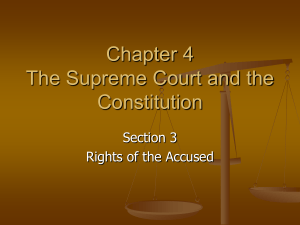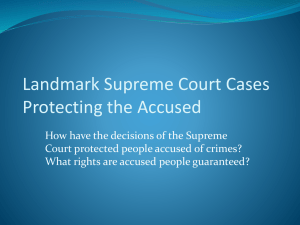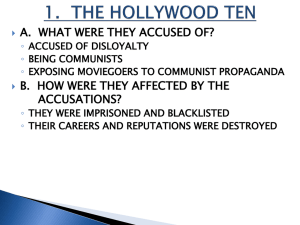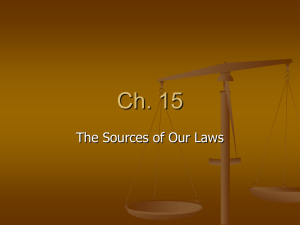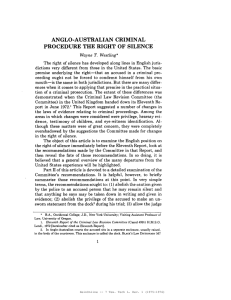The Judicial Branch - social studies by sak
advertisement
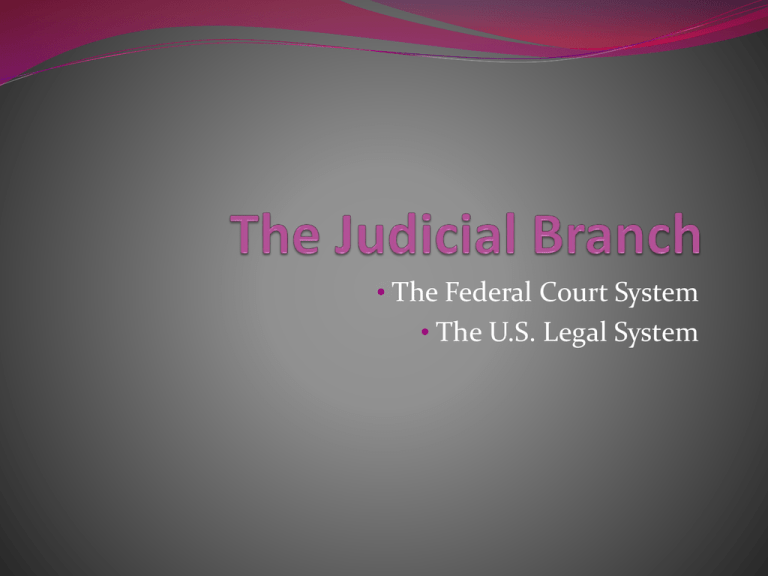
• The Federal Court System • The U.S. Legal System Role of Court Resolve disputes Interpret the law Set guidelines for similar future legal cases Lower Courts Can hear the following types of cases 1. A person is accused of disobeying the US Constitution 2. A person is accused of violating a US treaty 3. A person is accused of breaking federal laws passed by Congress 4. The US government or a US citizen is charged with an offense by a foreign nation 5. A person is accused of committing a crime on a US ship at sea 6. A US ambassador or other foreign service official is accused of breaking the laws of the country in which he/she is stationed 7. A person accused of committing a crime on certain types of federal property 8. A citizen of on state brings a lawsuit against a citizen of another state. Organization of the Lower Court System District Courts Determine the facts, reach a verdict, and apply the law Courts of Appeals Appealed district court cases Circuit Courts - 1 per judicial district Special Courts Claims International trade Appeals for the armed forces Territorial Tax Veteran appeals The Supreme Court Justices 9 Total The Chief Justice Presides over the group Appointed by the President Serve for Life Most retire in their late 70s Can be impeached for serious crimes Will hear on average 90 cases a year Websites http://www.supremecourt.gov/ http://www.supremecourt.gov/about/members.aspx U.S. Law Common Law – rulings made in earlier cases Cases of Negligence/Irresponsibility Statutory Law – made by local, state, or national gov’t. Constitutional Law – highest law in the country Administrative Law – regulations made by agencies Criminal Law – actions forbidden by society Punishable by imprisonment Civil Law – private disputes Personal injury, breaking of contract, etc. Pay fines or settle dispute Criminal Law Felonies Serious crimes (murder, rape, burglary, etc.) Misdemeanors Less serious crimes (resisting arrest) Criminal Justice System Police enforce the law Organized into counties i.e. Douglas County, NE Arresting Suspects Rights of the Accused 1. 2. Remain Silent Right to an Attorney Getting “booked” Picture and Fingerprints taken Background check conducted Appearance in Court 1st Hearing Is there enough evidence to hold the accused? Should bail be set for the accused? Bail money is called a Bond (security deposit) Preliminary Hearing Judge reviews the case Prosecutor tries to persuade the judge that the case should go to trial Indictment Formal accusation made in front of a grand jury Jury decides if the accused should be brought on formal charges Arraignment The accused is formally notified of the charges Enters a plea Guilty Not Guilty No-Contest Jury Selection 6-12 people Sequestered Trial Witnesses Subpoena – court order requiring the person’s presence The Verdict Majority Unanimous Hung jury Sentencing Punishment is given The Other Option Plea Bargain - agree to plead guilty to a less serious charge Corrections Probation Imprisonment Parole Capital Punishment




